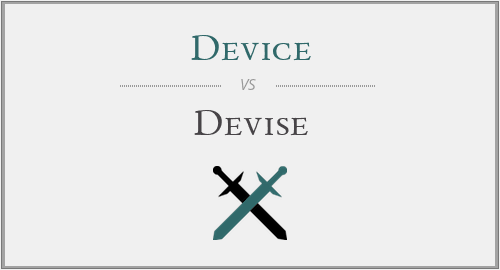Device" and "devise" represent a couple of words commonly misspelled due to their similarity. But how do you get rid of this confusion, which can turn into a real problem, especially in academic writing or official communications?
The solution is simple, you just have to understand the meaning of each word clearly so that confusing or misspelling them will be impossible in the future. We'll help you out with this!
Device vs. Devise
The main difference between "device" and "devise" is the part of speech they represent. "Device" is a noun and "devise" is a verb, while their meanings are also completely different.
"Device" refers to a piece of equipment, whereas "devise" defines the action of designing or inventing something. Read more about these and about how to use these two words correctly below.
When do we use "device"?
"Device" is a noun and should only be used to define a piece of equipment used for a specific purpose, for a particular reason. In addition to this primary meaning, "device" can also be used in a few expressions with some other significations, which we are going to illustrate below:
Example 1: A laptop is a device smaller than a computer, easier to transport, but with similar specifications. - "device" is a noun and it refers to a piece of equipment used for a particular reason.
Example 2: Leave my friends to their own devices, you won't change their mind anyway. - "devices" is also a noun in this expression, but "leaving someone to their own devices" refers to allowing someone to do what they want to.
When do we use "devise"?
Distinct from "device" due to only one letter, "devise" is ever so different regarding both its meaning and part of speech. It is a verb and it defines the action of creating a design or an invention of something similar to a plan, a system or a piece of equipment.
Example: I love this new program, it allows me to devise my own photo gallery. - "devise" refers to designing or planning something.
Conclusion
They might look almost identical and the difference between this couple of words might seem superficial, but it is not negligible at all. Their meanings are not just slightly different. Replacing "device" with "devise" can totally change your message and will always become a misspelling, because "device" is a noun and "devise" is a verb. Just keep in mind that "device" refers to a piece of equipment (such as a phone, a pager, a laptop etc.), while "devise" refers to creating a plan, inventing a device etc.





Have a discussion about this article with the community:
Report Comment
We're doing our best to make sure our content is useful, accurate and safe.
If by any chance you spot an inappropriate comment while navigating through our website please use this form to let us know, and we'll take care of it shortly.
Attachment
You need to be logged in to favorite.
Log In